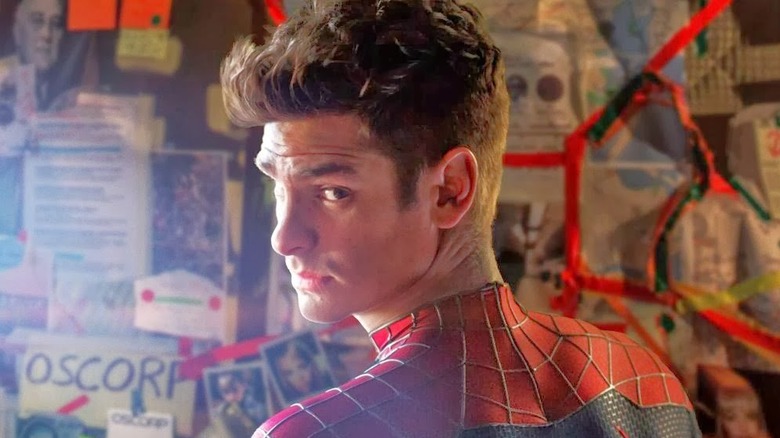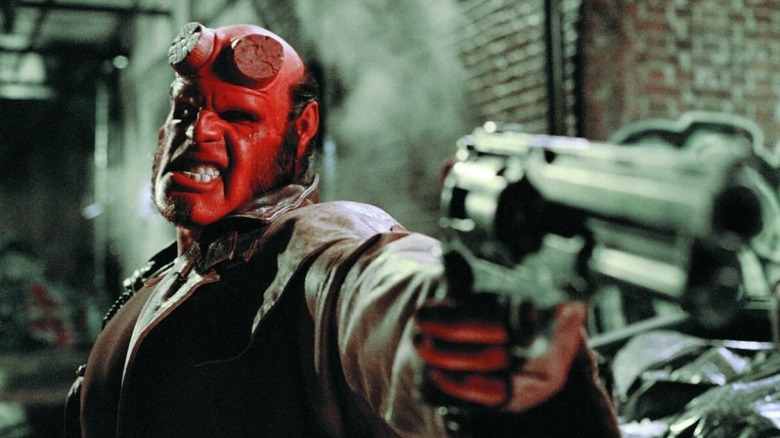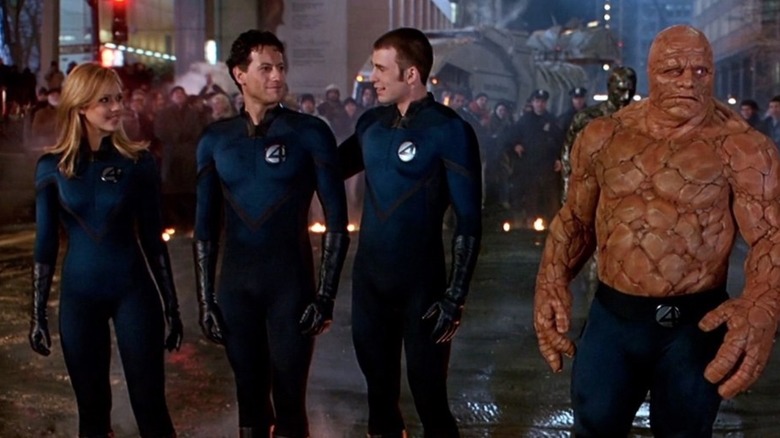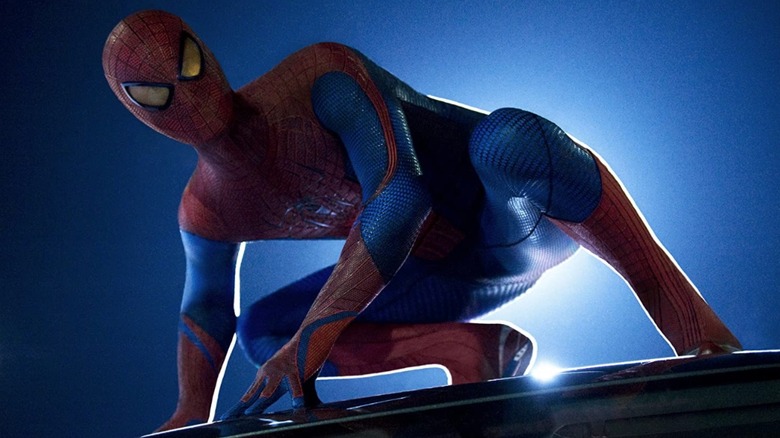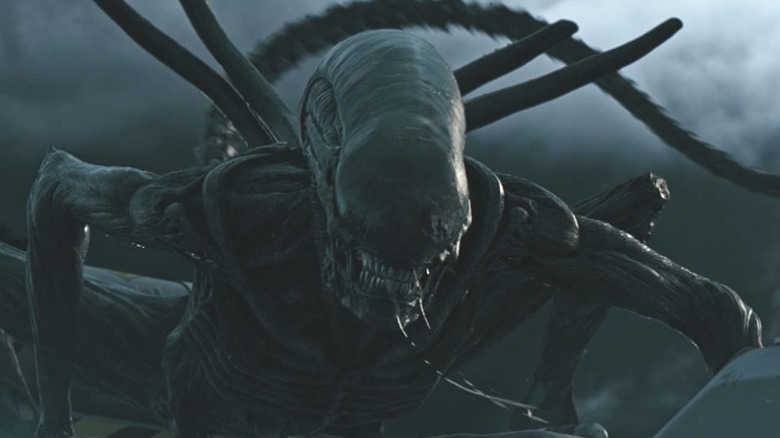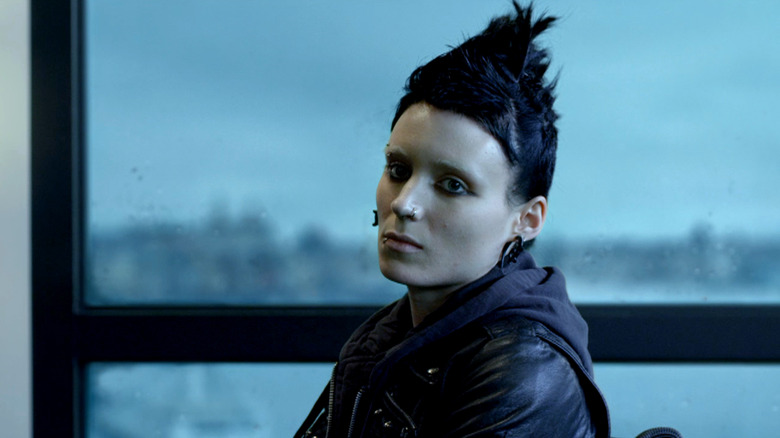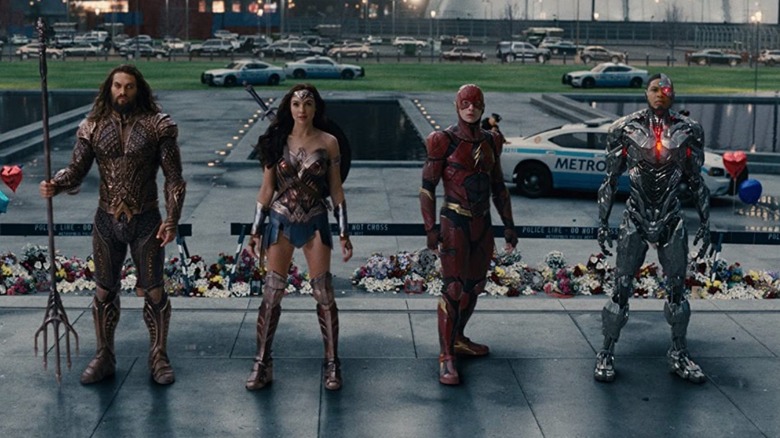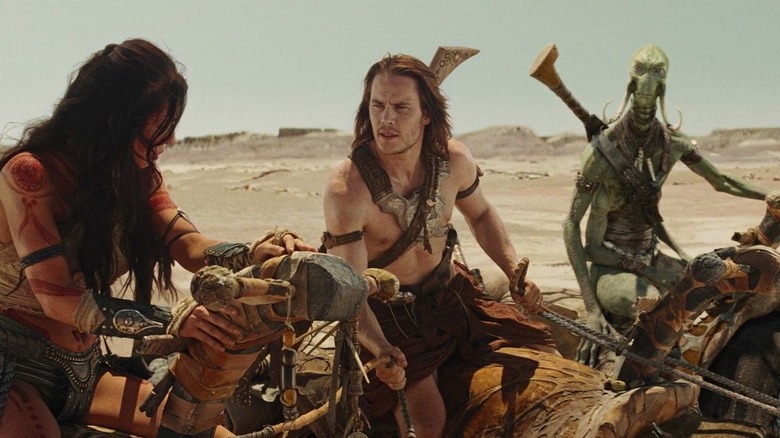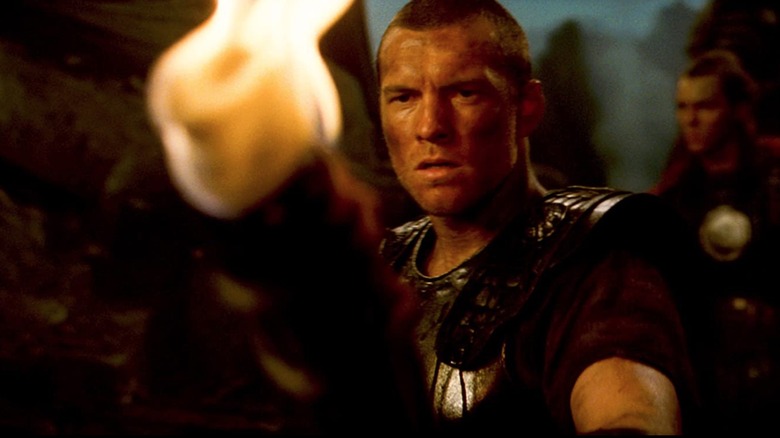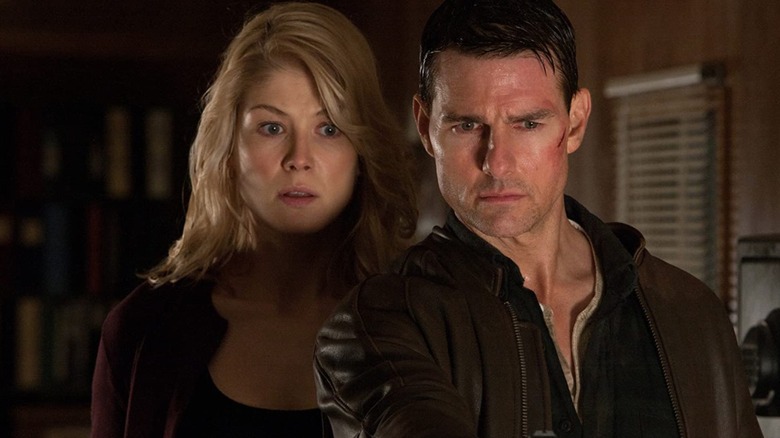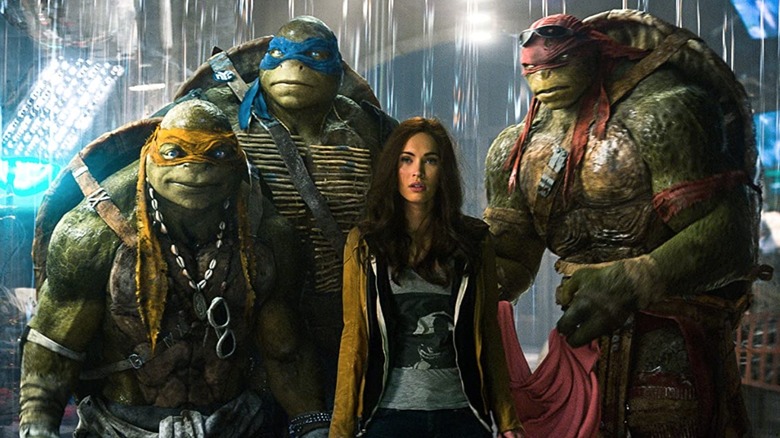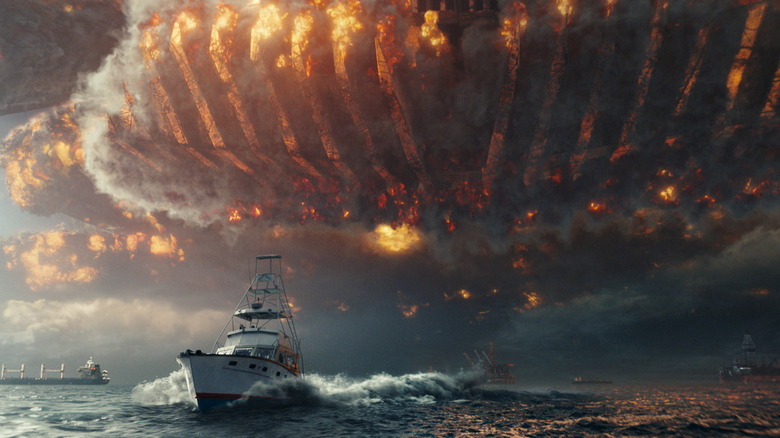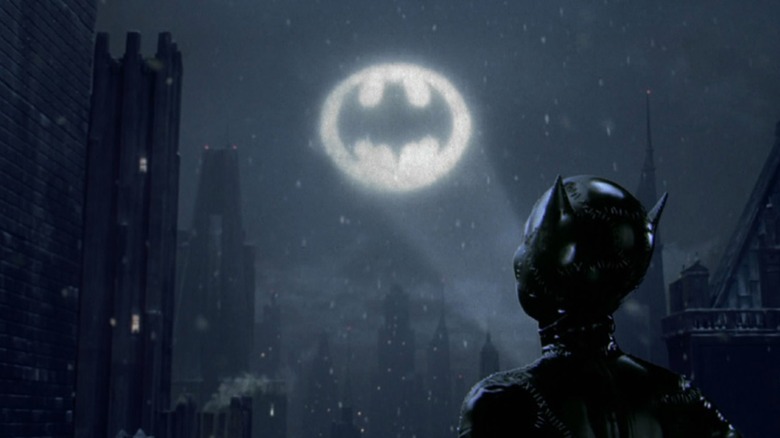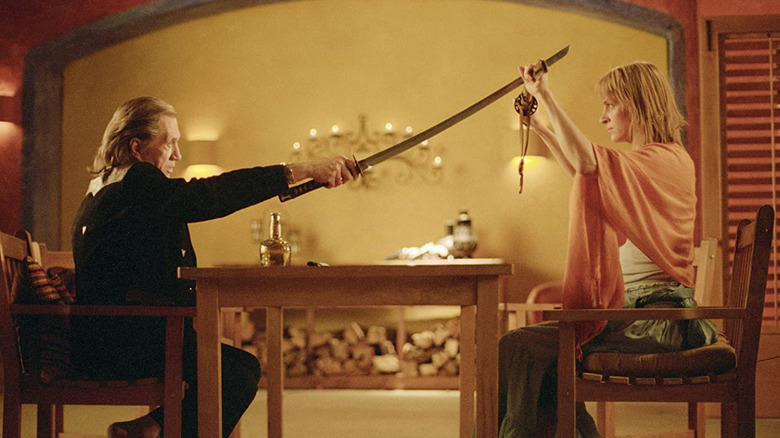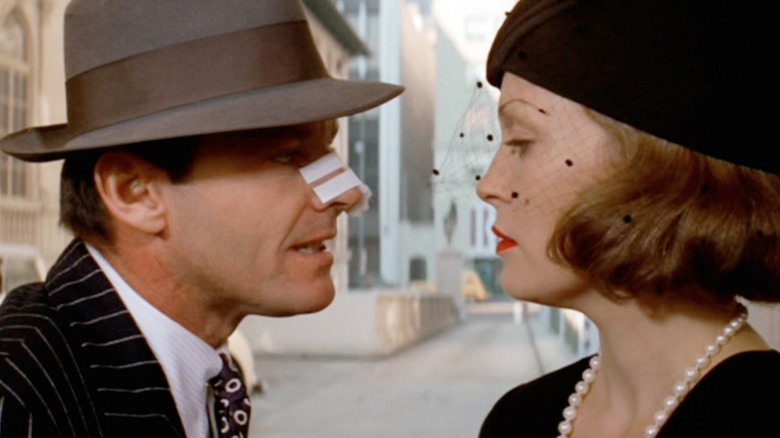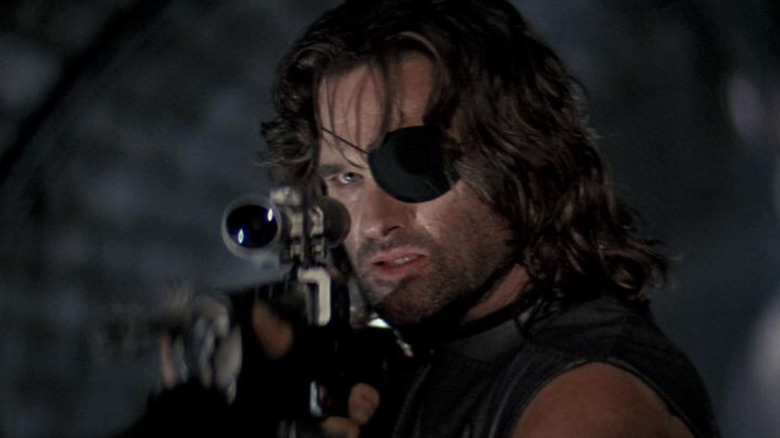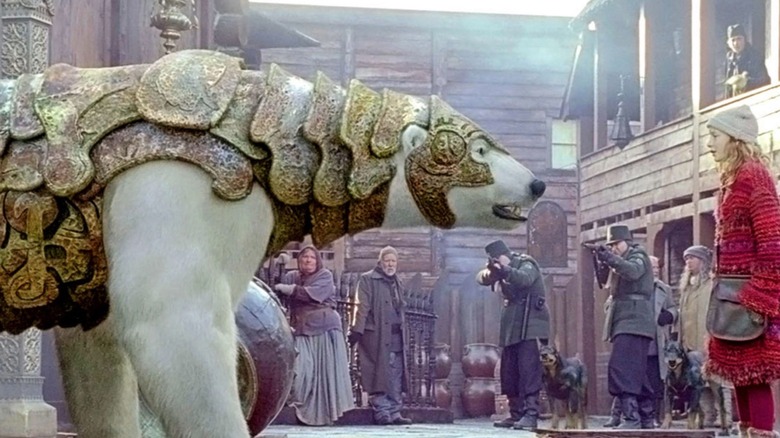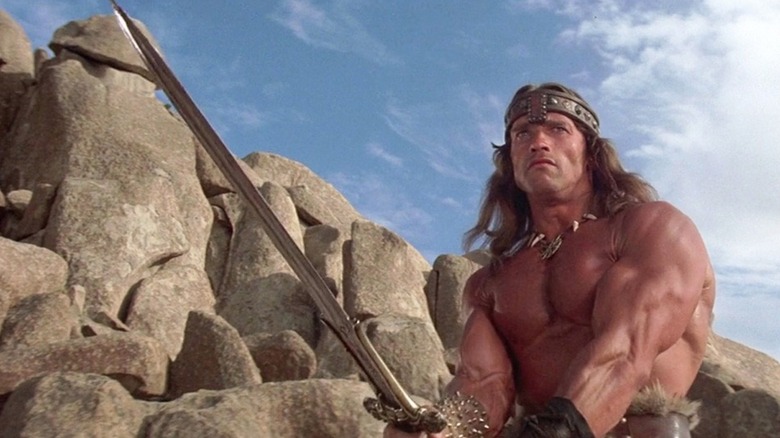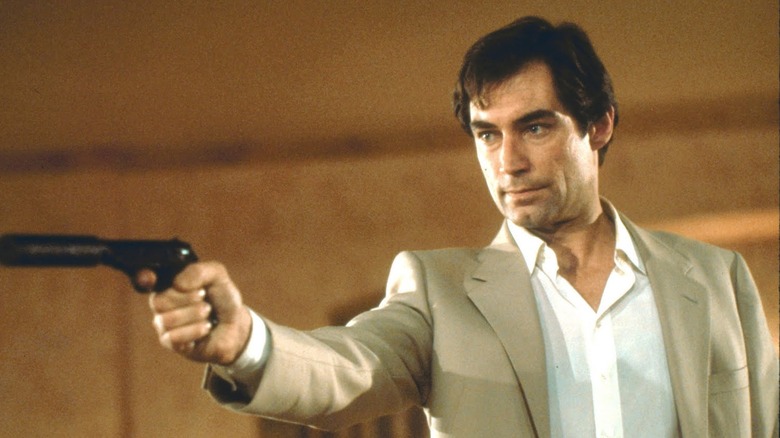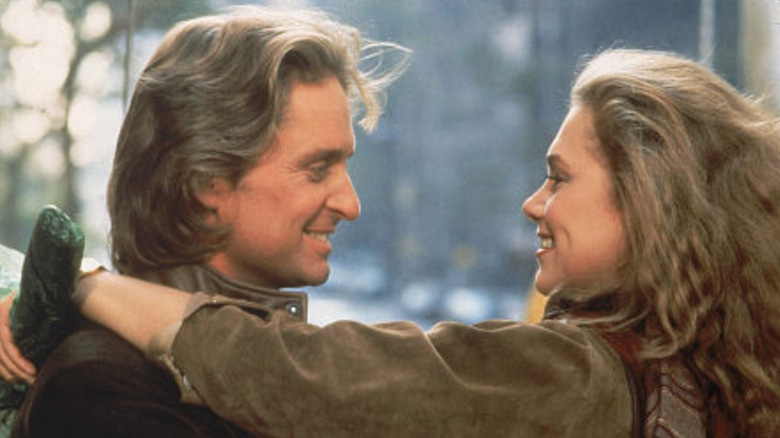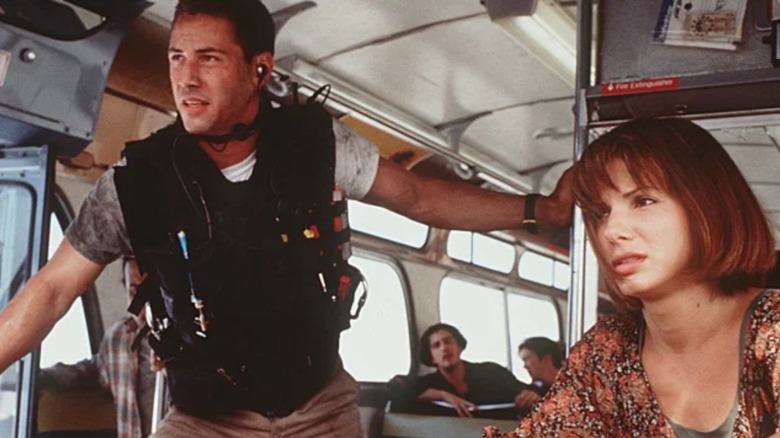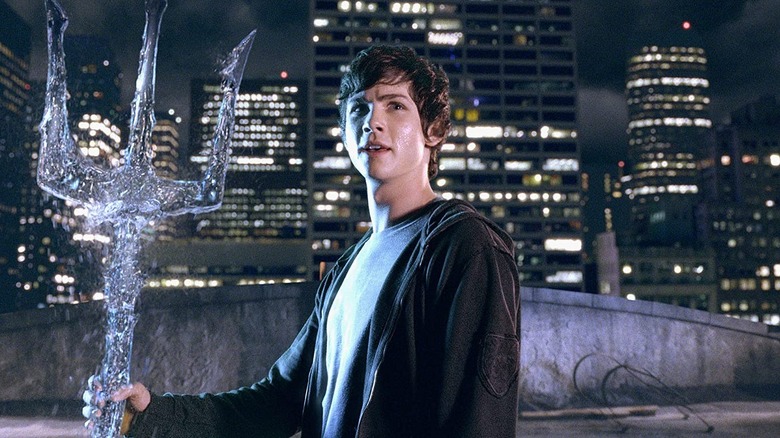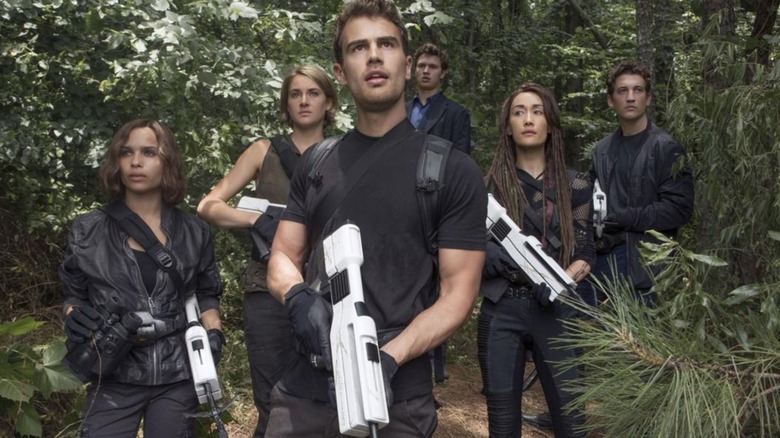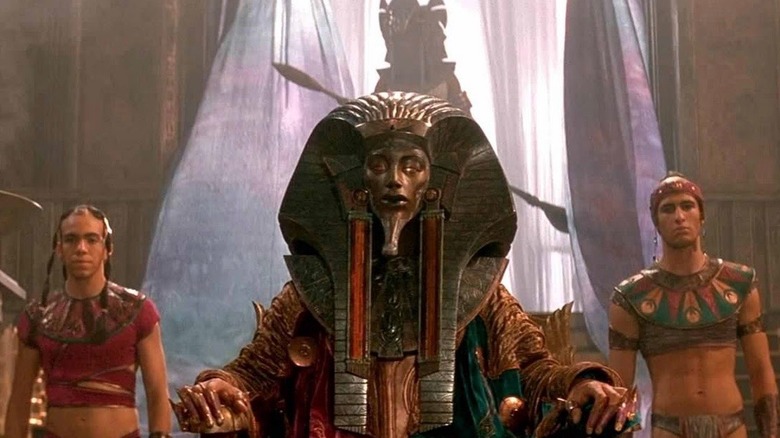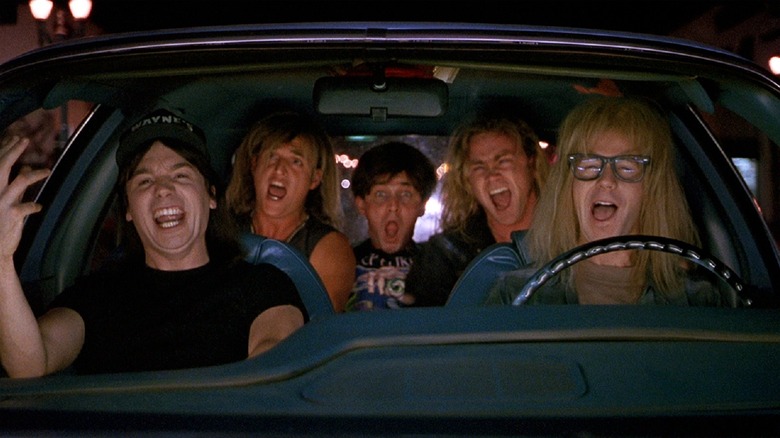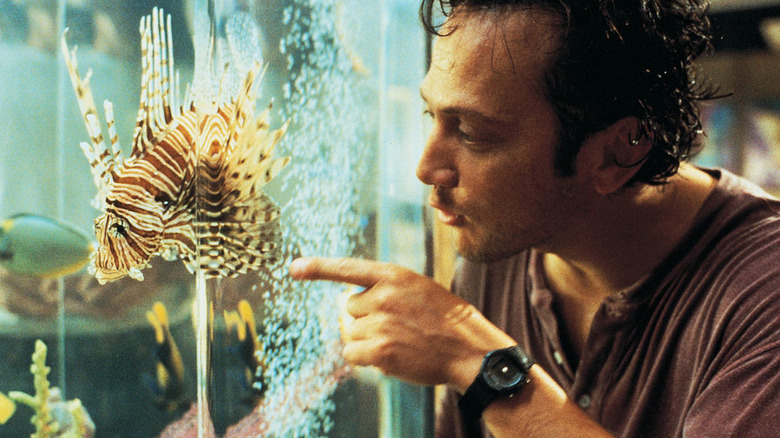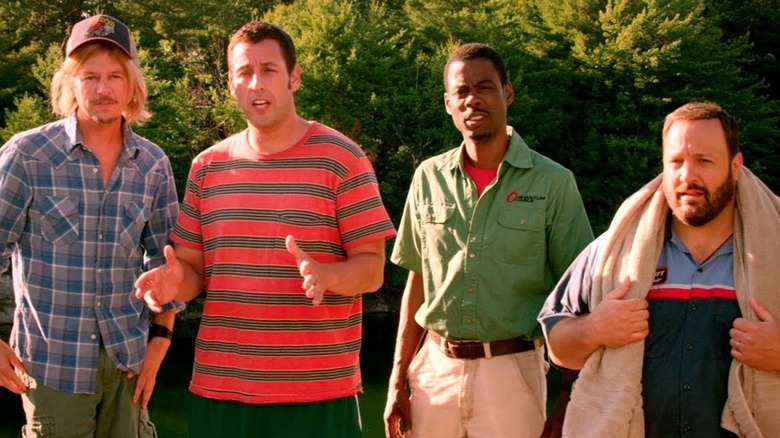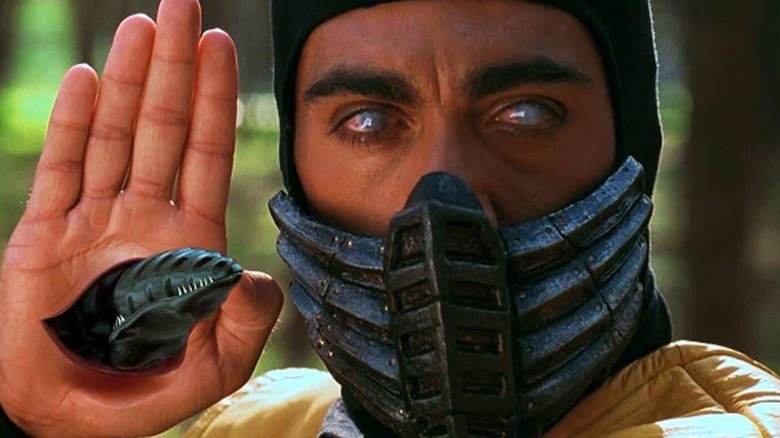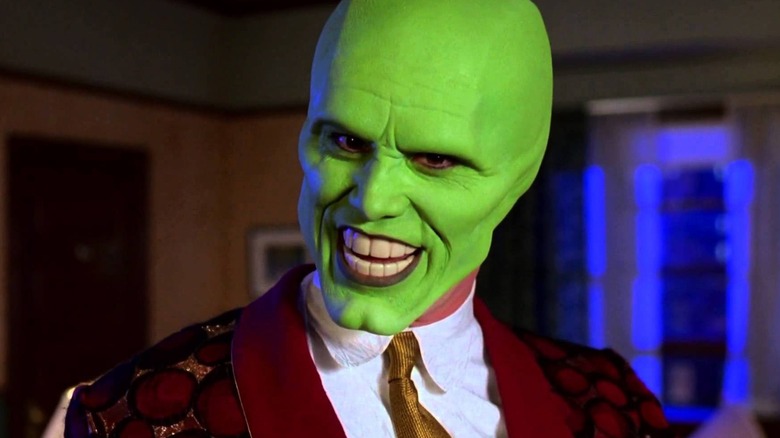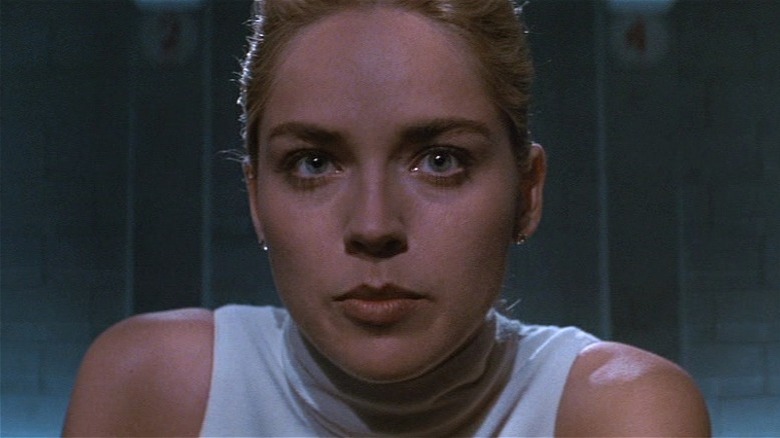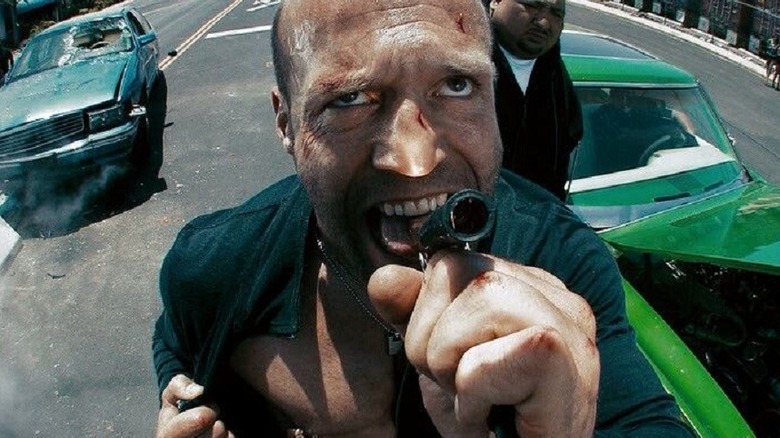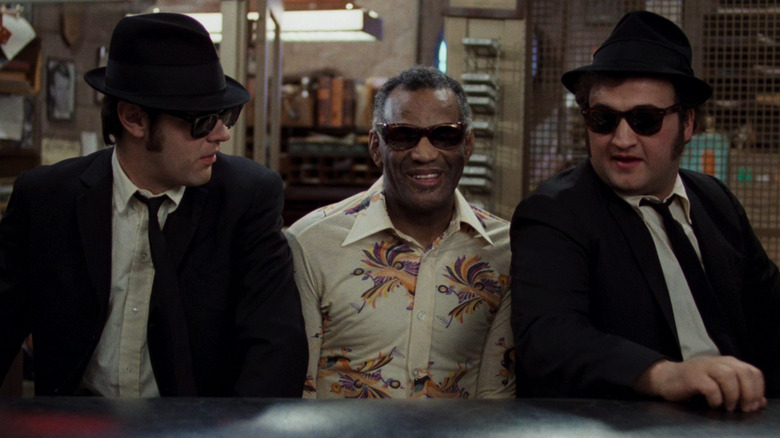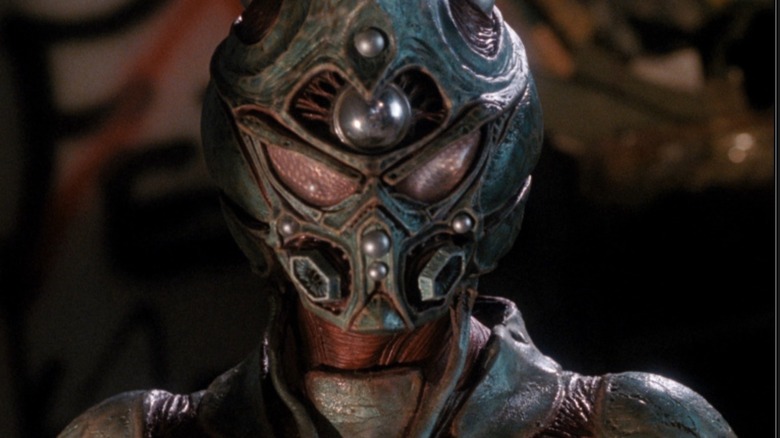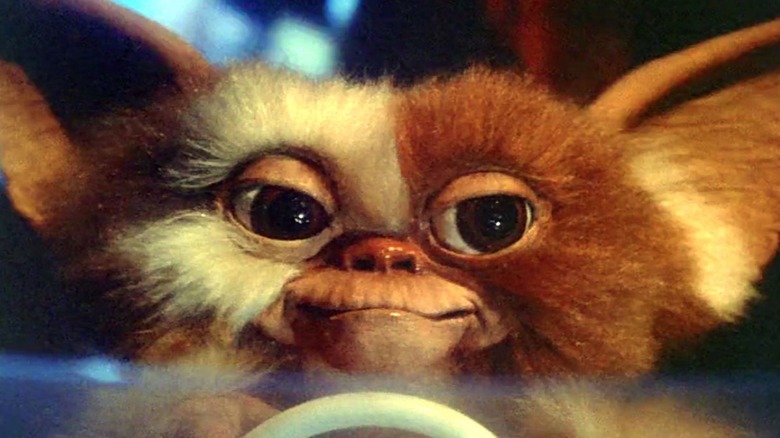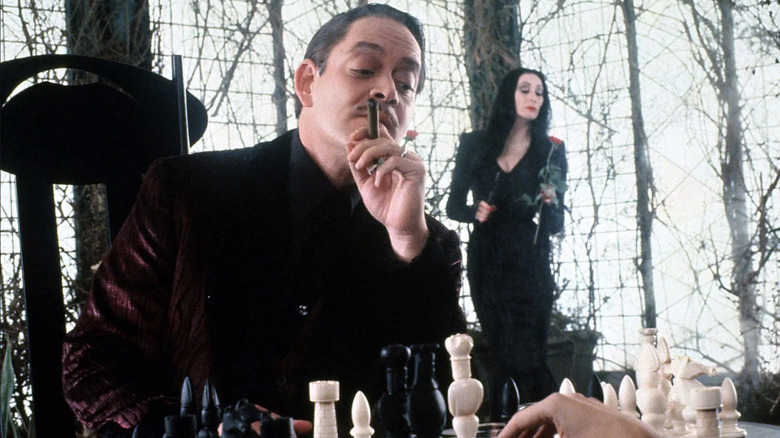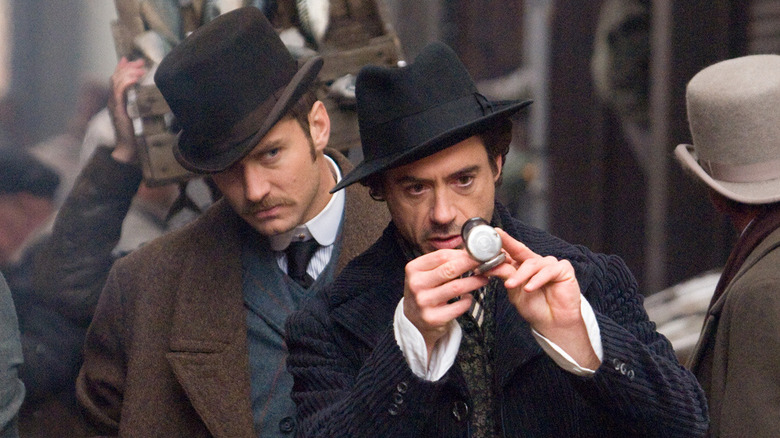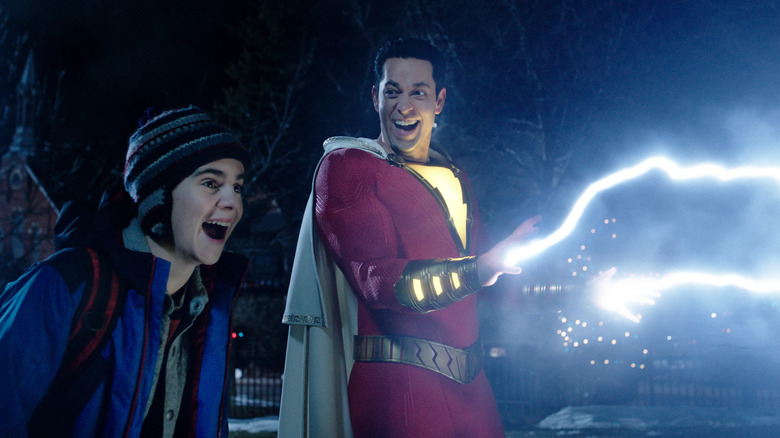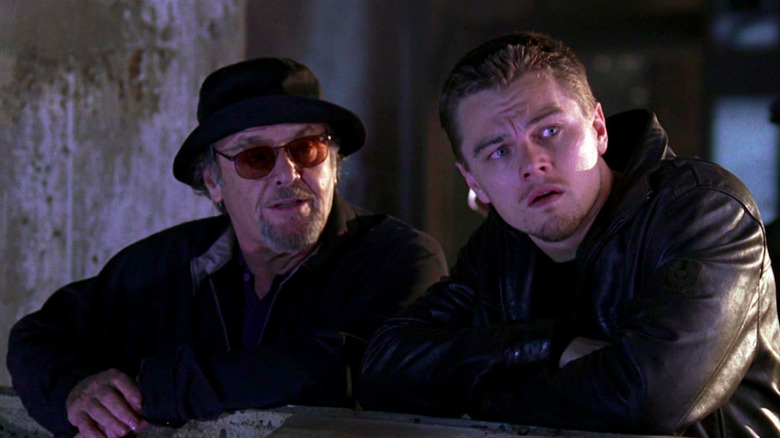Movie Trilogies That'll Never Be Completed
There's something truly special about great movie trilogies. These epic series — "The Lord of the Rings," "The Dark Knight," "Star Wars," and "The Evil Dead," to name a few — take the standard three-act narrative structure and expand it over the course of three films. And after we watch that final chapter, the audience is content with a story well-told, and Hollywood executives are rolling in the dough.
But not every trilogy goes as planned ... and some never even get to the finish line. After all, it's hard enough to make one successful movie, let alone three. So it's no surprise that many would-be trilogies never reach that final third film. Maybe they bombed at the box office, perhaps they were savaged by critics, or maybe there was behind-the-scenes drama. Whatever the reason, and whether or not they deserved another installment, these movie trilogies were stopped in their tracks and will never be completed — although never say never, right?
Hellboy
As comic book movies took off in the early 2000s, fans' hearts fluttered when geek god Guillermo del Toro took on an adaptation of Mike Mignola's Dark Horse comic series, "Hellboy." Del Toro proved his fanboy bona fides when he chose not to cast an A-list leading man, instead hiring the picture-perfect character actor Ron Perlman to play everyone's favorite cigar-chomping, monster-busting, gun-wielding, rosary-praying demon. Critics were into "Hellboy" too, giving it an 81% Tomatometer score, but its $59 million domestic and $99 million worldwide gross on a $66 million budget caused Revolution Studios to jump ship.
Universal picked up the rights and greenlit "Hellboy II: The Golden Army" for $85 million. It almost paid off, with even better reviews and a $168 million worldwide gross. Alas, "Hellboy II" had the bad luck of opening one week before "The Dark Knight" broke records, dropping a mind-boggling 70% in its second weekend. So while del Toro hoped to complete the trilogy, he knew his budget of $120 million was a tough sell, and tweeted in 2017 that his "Hellboy 3" was 100% not happening.
Lionsgate rebooted the series in 2019 with Neil Marshall as director and David Harbour as the big red guy, but moviegoers and fans said "hell no" to the new "Hellboy," which earned a 19% Tomatometer score and $44 million worldwide on a $50 million budget. That still hasn't stopped another company, Millennium Media, from producing a fourth film, 2024's "Hellboy: The Crooked Man," this time with Jack Kesy is our supernatural, stone-fisted superhero.
Fantastic Four
The Fantastic Four have had a rough time at the box office, starting with the 1994 film that's so bad it was never released. In 2005, the trend continued when "Fantastic Four" earned an atrocious 27% Tomatometer score. However, the film's light tone stood out against the doom-and-gloom movies released that summer ("Star Wars Episode III: Revenge of the Sith" and "Batman Begins"), and it earned $154 million domestically and $333 million worldwide on a modest $87 million budget.
"Fantastic Four: Rise of the Silver Surfer" did just as badly with critics, and this time, it couldn't count on counter-programming during the stacked summer of 2007 ("Transformers," plus sequels to "Spider-Man," "Shrek," and "Pirates of the Caribbean"), earning only $131 million domestically and $289 million worldwide on a $120 million budget.
While all five main cast members were signed to a three-picture deal, a 13% box office drop with a 25% higher budget gave Fox executives pause. Whatever fans the film had left had their hopes dashed when a pre-Captain America Chris Evans said a third film probably wasn't happening. But even though that trilogy was doomed, Fox tried to relaunch the series in 2015 with a dark, bleak tone that was totally off the mark. That resulted in the property's worst reviews and box office performance yet, with just $167 million worldwide on a $120 million budget. Now it's up to Marvel Studios — which reacquired the Four as part of Disney's $71 billion purchase of Fox — and 2025's all-new "The Fantastic Four: First Steps" to bring Marvel's First Family the glory they've been waiting for.
The Amazing Spider-Man
Spider-Man is really popular. The world's favorite wall-crawler broke the opening weekend box office record twice on his own and then two more times with the Avengers. The first "Spider-Man" sent the comic book movie renaissance into overdrive in 2002 when it became the first film to earn more than $100 million in a single weekend. "Spider-Man 2" continued the trend, and while 2007's "Spider-Man 3" ended the first series with a creative whimper, the Sam Raimi-Tobey Maguire "Spider-Man" films still earned more than $2.5 billion worldwide on a $597 million budget.
Sony rebooted the series five years later, this time with Andrew Garfield in the tights and Marc Webb in the director's chair for 2012's "The Amazing Spider-Man." The box office results were solid ($757 million worldwide on a $220 million budget), and the reviews were strong, so before a sequel was ever released, Sony announced a third and fourth film, as well as spinoffs for "Sinister Six" and "Venom," effectively launching a Spidey Cinematic Universe. "The Amazing Spider-Man 2" arrived in 2014, but despite earning $708 million worldwide on a smaller $200 million budget, the lower gross and horrible reviews meant Spidey was headed in the wrong direction.
Luckily, Disney swooped in and brought the web-spinner, now played by Tom Holland, back to his record-breaking ways in the MCU, while Sony scored huge with "Venom" and won an Oscar with "Spider-Man: Into the Spider-Verse." And while "The Amazing Spider-Man 3" was squished, Garfield's version of the character did get a conclusion of sorts to his story in 2021's MCU-set multiverse adventure, "Spider-Man: No Way Home."
Alien
The "Alien" franchise is a classic movie series that should have stuck with just two films. Ridley Scott made one of the greatest sci-fi/horror films of all time with 1979's "Alien," while James Cameron followed it up with one of the greatest sci-fi/action movies ever in 1986's "Aliens." If only it ended there. While "Alien 3" has been reappraised in recent years, studio interference forced director David Fincher to disavow the film, which underperformed compared to its all-time classic predecessors.
But you just can't keep a good xenomorph down. In 2012, Ridley Scott returned to the director's chair after 33 years to direct the much-anticipated "Alien" prequel, "Prometheus." The film received so-so reviews, but it still earned $402 million worldwide on a $125 million budget. Despite the lukewarm audience response, Scott had the confidence to announce his plans for three "Prometheus" sequels. But while "Alien: Covenant" earned a profitable $238 million worldwide on a tight $97 million budget in 2017, it suffered a steep 41% drop from "Prometheus."
While Ridley Scott and his cast were supposedly onboard for a sequel, to be titled "Alien: Awakening," a third film wasn't greenlit before the Disney-Fox merger. But Disney certainly still saw money in the "Alien" franchise — although it discarded Scott's "Alien: Awakening" in favor of the hit 2024 legacy sidequel, "Alien: Romulus."
The Millennium Trilogy
The late Swedish novelist and journalist Stieg Larsson was only able to complete three novels in his "Millennium" series before dying of a heart attack at age 50. His novels were published posthumously, becoming international best-selling hits. While David Lagercrantz published three more novels, Larsson's original adventures of journalist Mikael Blomkvist and hacker Lisbeth Salander are affectionately known as the "Millennium trilogy."
Sony Pictures saw dollar signs in the popular series — especially since the original Swedish screen adaptations had done well internationally – and assembled an all-star cast and crew for an English-language version. David Fincher, director of "Fight Club" and "Seven," was perfectly suited for this dark, sordid material, while Daniel Craig and Rooney Mara seamlessly brought Mikael and Lisbeth to life. "The Girl with the Dragon Tattoo" won raves from critics, but wasn't a runaway hit, earning $102 million domestically and $232 million worldwide on a $90 million budget in 2011. Sony wanted to cut costs on the sequel, but Craig, fresh off the $1 billion worldwide gross of "Skyfall," wanted a raise.
As a result, the studio squashed any hopes of a Mara-Craig trilogy. Instead, Sony opted to go with an entirely new cast in the 2018 sequel/reboot, "The Girl in the Spider's Web," casting Claire Foy as Lisbeth and Sverrir Gudnason as Mikael. Not even the film's modest $43 million budget could save it, as critics ravaged it and audiences killed it with a $14 million domestic and $35 million worldwide gross. The "Millennium trilogy" was a product of its time, and that time appears to have passed.
Justice League
If you told us back in, say, 2010 that a movie with Iron Man, Thor, and Hawkeye would make more money than a film with Batman, Superman, and Wonder Woman, we would have called you crazy. How did this happen? There are many reasons, but the shocking underperformance of the DCEU has mostly fallen at the feet of Zack Snyder. Snyder was handed the reins to the DCEU after "Man of Steel" made $667 million worldwide on a $225 million budget — and also because Christopher Nolan probably wasn't interested. Despite fan's disappointment with "Man of Steel" and "Batman v Superman: Dawn of Justice," each made money, mostly because they featured the most popular superheroes ever.
Still, we had dreamed about these movies for decades — was this the best we were going to get? Fans finally had enough, and Snyder's "Justice League" (which, to be fair, was re-shot and re-edited by "Avengers" director Joss Whedon) earned just $655 million worldwide on a $300 million budget, a slim profit margin but unacceptable when your movie features the Mount Rushmore of superheroes. Where would Snyder have gone with the series? According to Kevin Smith, the scrapped "Justice League" trilogy would have featured the Green Lantern Corps and Darkseid. While the original "Snyder Cut" of "Justice League" did get its day in court on Max — to mixed response from critics and fans — the "Snyderverse" itself was canceled in favor of James Gunn's rebooted DC Studios.
John Carter
Disney seems invincible in the 2010s, especially since 2019 was their most successful year in history. But in 2012, Disney released what may be one of the biggest bombs of all time, "John Carter." Based on Edgar Rice Burroughs' 100-year-old book series, "John Carter" was about a Civil War vet (Taylor Kitsch) who's transported to Barsoom, a Mars-like planet where he must defend humanoid aliens against 12-foot tall extraterrestrial barbarians.
Disney spent an astronomical $250 million on the film (some reports have it as high as $300 million), the most ever for a non-sequel. (For context, the first "Avengers" movie cost $220 million.) In the end, "John Carter" made only $73 million domestically and $284 million worldwide, weak numbers for a modestly budget film but absolutely devastating for a $250+ million one. In fact, if not for the record-breaking "Avengers" run in the summer of 2012, the failure of "John Carter" (it lost at least $200 million) might have sunk the Mouse House's live-action film division.
Since then, director Andrew Stanton has revealed there were plans for a trilogy, with the next two films already having titles and plots based on Burroughs' books. The collapse of "John Carter" obviously killed those dreams, but Edgar Rice Burroughs' estate regained the rights in 2014, hoping to bring the character back to the big screen. We predict we'll make it to Mars before that happens.
Clash of the Titans
While Leonardo DiCaprio followed up his role in a James Cameron record-breaker by making Steven Spielberg and Martin Scorsese movies, Sam Worthington followed up "Avatar" with ... "Clash of the Titans." Not quite the same, but hey, maybe it seemed like a good idea at the time. A remake of Ray Harryhausen's 1981 all-star classic, the 2010 "Clash of the Titans" also had a stacked cast that included Liam Neeson, Ralph Fiennes, and a kraken. However, the groan-inducing tagline summed up exactly what kind of movie this was: "Titans will clash!" That's like giving "Mad Max" the tagline "Max is mad!"
Needless to say, reviews were brutal, but the movie made enough money to buy real estate on Mount Olympus, earning $163 domestic and $493 worldwide on a $125 million budget. "Wrath of the Titans" (tagline: "Feel the wrath!") did just as badly with critics but much worse with audiences, making $302 million worldwide on a $150 million budget.
Warner Bros. was already planning a third "Titans" film, but the sequel's steep 40% decline gave the suits pause. By 2013, the film's producer, Basil Iwanyk, declared "Titans 3" D.O.A. unless there were fresh ideas, though we'd think Greek mythology would provide enough plots for 10,000 "Titans" movies. Actually, never mind, we don't want to give them any ideas. And while Worthington's post-"Avatar" career has disappointed, at least he has more of that franchise to look forward to.
Jack Reacher
Lee Child's ex-military policeman Jack Reacher has appeared in over 25 novels. Not once is he described as looking like Tom Cruise. Jack Reacher is six-feet-five-inches with hands the size of dinner plates, while Cruise is about five-feet-seven-inches with hands the size of that little plate you put under a tea cup, so Reacher looks like Tom Cruise ate a much taller Tom Cruise. While Reacher die-hards were upset with Cruise's casting, we've been suspending our disbelief with his movies for nearly 40 years. What's a few inches when you're the guy who straps himself to planes?
And while Cruise's stature was below average, "Jack Reacher" was an above-average crime thriller, earning a 63% Tomatometer score and $217 million worldwide on a $60 million budget. Say what you will about Cruise, the dude is money. However, the sequel's subtitle, "Never Go Back," unintentionally served as a warning, as it earned a 37% Tomatometer score and $159 million worldwide on a $60 million budget — still profitable but a troubling 27% drop. Clearly, fans rejected Cruise in the role. While Reacher's creator, novelist Lee Child, had nothing but nice things to say about Cruise as a person, he agreed with readers that Reacher's physicality was critical to the character — which is why man-mountain Alan Ritchson took over the role in 2022 for Prime Video's streaming series/reboot.
Teenage Mutant Ninja Turtles
Despite their popularity, the Teenage Mutant Ninja Turtles haven't had box office staying power. The first film trilogy started strong when "Teenage Mutant Ninja Turtles" earned $202 million worldwide on a $13.5 million budget in 1990. However, 1991's "TMNT II: The Secret of the Ooze" dropped 62% to $78 million worldwide, while the third film took a shell-acking at the box office in 1993, earning $42 million on a $21 million budget. As a result, America's favorite talking, martial arts-fighting terrapins went on a 21-year hiatus from live-action, big-screen adventures (2007's "TMNT" was animated).
Following the enormous success of the "Transformers" films, Paramount saw dollar signs in making movies based on other characters from super-popular '80s toy lines and TV shows, so the studio decided to give the reptiles another a chance. Released in 2014, "Teenage Mutant Ninja Turtles" was no slow-moving tortoise, earning $485 million worldwide on a $125 million budget. Paramount was feeling confident, so they upped the budget for 2016's "Teenage Mutant Ninja Turtles: Out of the Shadows" to $135 million, but this time, the turtles only brought $245 million worldwide, a 50% drop that made this over-budgeted followup a box office bomb.
Paramount wasn't going to make the same mistake as New Line Cinema did with the first series, and the studio pulled the plug before making a third film. By late 2016, producer Andrew Form told Collider, "I don't think there's 'Turtles 3,' but I wouldn't say there's never going to be another 'Turtles' movie." And he was right: going back to the franchise's animated screen roots, "Teenage Mutant Ninja Turtles: Mutant Mayhem" arrived in 2023 to solid box office and critical acclaim.
Independence Day
"Independence Day" was one of the seminal summer movies of the 1990s. It blew up the box office in the summer of 1996, earning $306 million domestic and $817 million worldwide to become the highest-grossing movie of the year. When a movie makes that much money, especially on a modest $75 million budget, it usually means sequels. Lots of them. But a funny thing happened on the way to outer space. Summer after summer, big movies came and went, but an "Independence Day" sequel was never one of them.
But 2015 was the year of nostalgia, as the year's two biggest blockbusters were long-awaited, much-anticipated sequels to franchises from the past — "Star Wars: The Force Awakens" and "Jurassic World." Based on those two films' success, Fox figured that "Independence Day: Resurgence" would be the next sequel to a beloved blockbuster that would rule the summer. Boy, were they wrong.
There were a few problems. One, "Resurgence" didn't feature original star Will Smith, who opted not to return and had his character killed off. Second, this film wasn't just bad — it was really weird. Consequently, "Independence Day: Resurgence" seriously underwhelmed with $384 million worldwide on a $165 million budget, an alarming 53 percent drop that's even more startling considering the 20-year difference in ticket price inflation. Clearly, moviegoers were over the series. Given that the Disney-Fox merger shook up all of Fox's slate, there's no way "Independence Day 3" will ever happen.
Batman
The Tim Burton/Joel Schumacher "Batman" franchise broke the opening weekend record three times (tied with "Jurassic Park" and "The Avengers"), but neither set of films ever got a proper send-off. While all four films are technically part of the same series, they feel like two different franchises, as each director started strong but got cocky and went totally off the rails in their second outing.
"Batman Returns" is arguably the most Tim Burton-y movie ever, while "Batman and Robin" is definitely the most Schumacher-y. After moviegoers rejected each director's second film, neither director got to complete his trilogy. While Tim Burton never got to the scripting stage on "Batman III", rumors circulated that Michelle Pfeiffer was returning as Catwoman and Robin Williams was set to play the Riddler. However, after "Batman Returns" terrified children and dropped 36% from the first film's worldwide gross, Burton was politely asked not to return, and Michael Keaton bailed.
Schumacher brought the series back to its record-breaking ways with "Batman Forever" in 1995, so Warner Bros. was already planning a third Schumacher movie (the fifth overall) before "Batman and Robin" was even released. Screenwriter Mark Protosevich even penned a dark outline titled "Batman Unchained" with Scarecrow as the villain. However, the critical and commercial failure of "Batman and Robin" in 1997 put the Caped Crusader back in the cave for eight years, until Christopher Nolan rebooted the series with "Batman Begins." Thankfully, Nolan got to complete his "Dark Knight" trilogy.
Kill Bill
With a combined $1.2 billion domestic and $2.29 billion worldwide box office, Quentin Tarantino can pretty much call his own shots. Still, one of his hardest sells was "Kill Bill," a kung-fu/spaghetti Western/revenge thriller mishmash that was originally meant to be one four-hour film, but was wisely split into two releases. "Kill Bill. Vol. 1" sliced up a 85% Tomatometer rating, and earned $70 million domestically and $176 million worldwide. "Kill Bill Vol. 2" got a comparable 84% score from critics, but with less wall-to-wall action, earned $66 million domestically and $153 million worldwide — a 14% drop.
While the "Kill Bill" films were modest successes, Tarantino went over-budget and got behind schedule, forcing him to cut a climatic beachside battle between the Bride (Uma Thurman) and Bill (David Carradine), and missing the Cannes film festival. He revealed plans for a "Vol. 3" in 2004, saying it would feature Vernita Green's (Vivica A. Fox) daughter seeking revenge against the Bride, and he would film it 15 years later.
While 15 years seemed like an impossibly long time then, 2019 came and went with no "Vol. 3," and Tarantino conceded in 2012 that a third film was "probably not" happening. "Probably not" seemed to turn into "definitely not" when Uma Thurman called Tarantino out for a stunt that nearly killed her, though the two apparently mended fences. With Tarantino now planning for his next film to be his last, he said in July 2023 that "Kill Bill Vol. 3" was no longer an option.
Chinatown
"Chinatown" brilliantly mixed the film noir genre of the 1940s with the New Hollywood aesthetic of the 1970s, becoming one of the defining films of the decade. While its $29 million box office didn't break records in 1974, its 11 Oscar nominations and one win (best screenplay for Robert Towne) at the 1975 Academy Awards cemented its sterling reputation, especially as it went toe-to-toe with "The Godfather Part II." While "Chinatown" is remembered as an all-time great, its 1990 sequel has been practically forgotten.
Jack Nicholson returned as gumshoe J.J. "Jake" Gittes in "The Two Jakes," also stepping in for Roman Polanski as director of the sequel, written once again by Robert Towne. The film's 68% Tomatometer score wasn't bad, but hardly a worthy followup to the original masterpiece. Its box office was atrocious, earning just $10 million. Turns out a "16 years later" sequel to an original that wasn't a huge box office hit wasn't a wise financial move (which would be repeated by "Tron: Legacy" in 2010 and "Blade Runner 2049" in 2017 ... Hollywood never learns).
Nicholson said in 2007 that a third film would have been set in 1968 and been about Jake's divorce, with the title "Gittes vs. Gittes." Given Nicholson effectively retired in 2010, this pulp detective take on "Kramer vs. Kramer" will probably never happen.
Escape from Earth
"Escape from New York" introduced one of the most iconic characters ever in the eye-patch-wearing, smack-talking Snake Plissken, played with a rebellious swagger by Kurt Russell. While the film made a profitable $25 million worldwide on a $6 million budget in 1981, it wasn't the kind of breakaway blockbuster that demanded an immediate sequel. Carpenter and Russell focused on other projects in the 1980s, including their equally beloved collaboration "Big Trouble in Little China."
Meanwhile, the reputation of "Escape from New York" continued to grow, so in 1996 the duo returned for "Escape from L.A." Releasing a sequel to a cult hit 15 years after the original was a risky bet, especially with a $50 million budget — twice what the original film even made. "Escape from L.A." face-planted with critics and bombed with crowds, earning just $25 million worldwide — the same as the first film, but selling far less tickets after 15 years of inflation, and with 10 times the production budget.
While a sequel, tenatively titled "Escape from Earth," was no longer headed to theaters after that, there were plans for a TV series in the early 2000s, but it was never picked up. While seeing anyone besides Russell wearing the eyepatch seems sacrilegious, a remake was announced in 2015 and has gone through several permutations and filmmakers while trapped in development hell, with "Scream" reboot directors Tyler Gillett and Matt Bettinelli-Olpin departing the project in 2024.
The Golden Compass
In the wake of the success of films based on "The Lord of the Rings" and the "Harry Potter" series, fantasy novels become as hot a property as comic book adaptations. One of the surefire winners seemed to be Philip J. Pullman's "His Dark Materials," a grim epic that had everything a fantasy fan could ever want. There was just one issue: "His Dark Materials" has a storyline about the evil Magisterium that is unapologetically anti-Catholic.
New Line Cinema, the studio that had brilliantly guided "The Lord of the Rings" into the record books, also thought it was a good call to release this anti-religion fable during the Christmas holiday season, leaving one to wonder if any studio executives had even read what they were buying. While "The Golden Compass," based on the first novel in Pullman's series, was stripped of its religious themes, its reputation took root and the film was protested by Christian groups.
However, its biggest sin among non-religious moviegoers was that it was just plain bad, with a 42% Tomatometer score. On an epic $180 million budget, it earned just $70 million domestic and $372 million worldwide, putting the nail in the film trilogy's coffin. Fortunately for fans, the books were adapted as a three-season limited series for the BBC and HBO that ran from 2019 to 2022.
Conan the Barbarian
"Conan the Barbarian" introduced Arnold Schwarzenegger to the world — or at least to those of us who don't watch bodybuilding competitions or terrible comedies. Finding the right role for the mountain-sized, Austrian-accented Arnie proved challenging, especially coming off a decade where the "biggest" movie stars were smaller than Arnie's breakfast. Schwarzenegger found the perfect part for his glistening pecs in 1982's "Conan the Barbarian," which earned $38 million domestically and $79 million worldwide on a $20 million budget.
A sequel was pushed into production, yet despite its lower $18 million budget, "Conan the Destroyer" proved the Cimmerian warrior was a one-hit wonder, bombing with $26 million worldwide in the summer of 1984. Arnold wasn't heartbroken for long, as James Cameron's low-budgeted "The Terminator" became a massive hit just a few months later, making Schwarzenegger one of the biggest stars of the '80s. The proposed "Conan 3" became the atrocious "Kull the Conqueror,", proving Arnold made the right call in passing on it.
However, after conquering California politics, Arnold sought to make "The Legend of Conan,", playing the barbarian as an aged king. When that project died a grisly death, an Amazon series was announced, but that was also scrapped, with Arnold claiming the rights holders were the issue. While the screenwriter hoped to resurrect "Conan 3," the box office death of "Terminator: Dark Fate" probably permanently stalled any hope for further Schwarzenegger nostalgia projects.
Timothy Dalton's James Bond
There have been many films in the official James Bond series. Sean Connery and Roger Moore played the character the most times (six and seven, respectively, with Connery getting a seventh turn in the non-canon "Never Say Never Again"), while Daniel Craig (five) and Pierce Brosnan (four) were not far behind. Timothy Dalton was set to play the legally lethal spy three times, an informal trilogy in the larger series, but only got two. Dalton's trilogy capper, what would have been the 18th film in the official series, never came to pass.
Despite its reputation as a franchise killer, Dalton's second outing, 1989's "License to Kill," made $34 million domestically and $156 million worldwide on a $42 million budget — a profitable sum, but not even in the top 15 during a historic summer dominated by "Batman" and "Indiana Jones and The Last Crusade."
Still, Dalton was all set to return for his third and final Bond film, which was set to feature a British-Chinese megalomaniac using the threat of nuclear meltdowns to force the British to return Hong Kong to China. However, legal wrangles halted pre-production for years, and by 1994, Dalton finally dropped out. It may have been the best thing for the series, as "GoldenEye" made $356 million worldwide, launching Brosnan's highly successful run as the super spy.
Romancing the Stone
Before 1985's mega-hit "Back to the Future," director Robert Zemeckis took the romantic comedy/action-adventure hybrid nobody wanted and turned it into a major hit. "Romancing the Stone" had a modest $10 million budget, but legged it out from a $5 million opening to $75 million domestically and $115 million worldwide. The spring release wasn't just Fox's biggest hit of the year; it was their only hit. So naturally, they wanted to rush through a sequel. The only problem? Stars Michael Douglas and Kathleen Turner didn't want to do it, which is really saying something considering Douglas was also a producer.
Fox exercised its sequel option and even threatened to sue Turner for $25 million when she tried to quit. The troubled production didn't improve anyone's mood either. "The Jewel of the Nile" miraculously made it to theaters 19 months after "Stone," but only made $68 million worldwide. A proposed third film, "The Crimson Eagle," was not a high priority for anyone at the time, though Douglas did drop out of 1997's "U-571" a decade later to return for a sequel that never happened.
In 2008, a new sequel, "Chasing the Monsoon," was announced, with Douglas' wife Catherine Zeta-Jones replacing Turner. That project quickly became a remake instead, potentially starring Gerard Butler and Katherine Heigl, but in 2011 it was shelved for a TV series. With no news since, it's safe to say this romance is dead.
Speed
Take action star Keanu Reeves, America's sweetheart Sandra Bullock, and Dennis Hopper being creepy Dennis Hopper, and you get the 1994 hit "Speed." While the film's "'Die Hard' on a bus!" vibe powered it to $121 million domestic and $283 million worldwide on a $30 million budget, it was actually based on a story by master Japanese filmmaker Akira Kurosawa. Unfortunately, Kurosawa never conceived of a sequel and Reeves turned it down too, a decision he said landed him in "movie jail" with Fox for years. But the studio pressed on with "Speed 2," nonetheless.
Bullock was back, with Jason Patric replacing Reeves as her supercop boyfriend, and Willem Dafoe giving Hopper a run for his money in the scenery-chewing psycho villain department. Alas, Patric was no Reeves, plus the movie was really, really bad (a 4% Tomatometer score... yikes), so "Speed 2: Cruise Control" sank with $48 million domestic and $150 million worldwide on a $110 million budget, a 47% drop despite costing four times as much. Ouch. Still, while Reeves has since gone on to superstardom with the "Matrix" and "John Wick" franchises, he's indicated as late as 2023 that Jack Traven from "Speed" is a character from his past that he'd like to revisit.
Percy Jackson
Based on the popular YA book series, 2010's "Percy Jackson and the Olympians: The Lightning Thief" is about a teenager who discovers he's descended from a Greek god. Hey, high school was weird for all of us, right? Critics gave it a mediocre 50% Tomatometer score, but its release during the normally non-competive month of February powered the family film to a $88 million domestic, $223 million worldwide take, a narrow victory on a $95 million budget. Critics were even less impressed with 2013's "Percy Jackson: Sea of Monsters," striking it down with a 42% Tomatometer score.
Despite shaving $5 million off the first film's budget, "Sea of Monsters" only managed $68 million domestically and $200 million worldwide. Even worse, its $14 million opening weekend was less than half the first film's $31 million, indicating a major drop in audience interest. Star Logan Lerman said in 2014 that he'd be happy to return for a (contractually obligated) third film, but eventually confirmed in 2020 that "Percy Jackson 3" wouldn't be happening. Instead, the franchise made the leap to the small screen in 2023, with a TV series premiering on the Disney+ streaming platform.
Divergent
If you want to add prestige to your YA movie franchise, turn the final film into a two-parter. It was a trend in YA movie adaptations that included "Twilight Saga: Breaking Dawn," "Harry Potter," and "The Hunger Games." Also, let's be honest, it was just an easy way to make more money, especially when you filmed the two parts at once. After all, who'd be dumb enough to only film Part 1 of a two-parter, right? Enter the "Divergent" series.
The first, released in 2014, managed $276 million worldwide on a $85 million budget, while the second made $295 million against a $110 million budget a year later, though its domestic opening weekend and box office were smaller. That should have been a clue, but Lionsgate, chasing their success with "The Hunger Games," went full steam ahead on a two-part conclusion. Wrong move.
"The Divergent Series: Allegiant" tanked in 2016 with $66 million domestic and $172 million worldwide on a $110 million budget. Spending the money to properly conclude the trilogy would be a death wish, so "The Divergent Series: Ascendant" was announced as a TV movie instead, before being cancelled. The "Divergent" series is an interesting inclusion on this list, for although it had three films, the third was only the first half of a concluding chapter that will never be completed.
Stargate
"Stargate" never had a trilogy despite "the franchise" being financially successful. Of course, it helps when there's only one film in the series, but still. "Stargate" caught the moviegoing world off guard in 1994, setting a new October opening weekend box office record at the time with $16 million, eventually earning $71 million domestic and $196 million worldwide. Filmmakers Roland Emmerich and Dean Devlin had planned a trilogy of films, with each movie focusing on a different mythology.
However, they parlayed their "Stargate" success into one of the biggest hits of the '90s with "Independence Day" (and then one of its biggest disappointments, "Godzilla"). Meanwhile, MGM put the film series on hold thanks to the success of the TV franchise, which started in 1997 with "Stargate SG-1" and included "Stargate: Atlantis" and "Stargate Universe."
Some 12 years after the original, Devlin revealed plans for a sequel at 2006's San Diego Comic-Con, but it would be another eight years before a new "Stargate" was announced — and this time it would be a remake. However, the failure of "Independence Day: Resurgence" in 2016 seemed to kill any interest in reviving Emmerich and Devlin's other 1990s sci-fi property, and the "Stargate" trilogy was officially canceled in 2018.
Wayne's World
The "Wayne's World" franchise is the most successful "Saturday Night Live" film series ever, earning $169 million domestically and $231 million worldwide. Getting that much dough usually spells sequels, but instead, we wound up with mediocre "SNL"-based movies like "A Night at the Roxbury," "Superstar," and "The Ladies Man." What gives?
For one, "Wayne's World 2" absolutely plummeted, earning $136 million less in 1993 than "Wayne's World" did in 1992. It was still profitable, but that's a scary 76% drop. Paramount may have still been willing to produce "Wayne's World 3," but the creative team wasn't interested. Mike Myers left "SNL" in 1995 and went on to star in the hugely successful "Austin Powers" and "Shrek" franchises. Meanwhile, Dana Carvey starred in his own short-lived TV show, "The Dana Carvey Show," starting in 1996.
In 1993, it was reported that vast creative differences over "Wayne's World 2" fractured the relationship between Myers and Carvey, starting with Myers' first draft of the script, which included plenty of Wayne — but not a lot of Garth. Couple that with Carvey's medical issues and the fact the two didn't speak for years, and it's no surprise we never saw "Wayne's World 3," and we probably never will. The duo reunited for an Uber Eats commercial during Super Bowl LV, which is probably as close to a third film as we'll ever get.
Deuce Bigalow: Male Gigolo
"Saturday Night Live" alum Rob Schneider had a solid career in Hollywood as "Adam Sandler's friend" for nearly 10 years when he graduated to above-the-title status with "Deuce Bigalow: Male Gigolo." Its 22% Tomatometer score didn't scream "Citizen Kane," but it made more money than anyone could've rightly expected, earning $92 million worldwide on an $18 million budget. While Schneider continued to play scene-stealing backup roles for his A-list superstar friend, he got to be the center of attention himself in 2001's "The Animal" and 2002's "The Hot Chick."
It wasn't until 2005 that Schneider returned to his signature role for "Deuce Bigalow: European Gigolo," but after six years, the audience had moved on. Besides its atrocious 9% Tomatometer score, "Deuce Bigalow: European Gigolo" made $45 million worldwide on a $22 million budget, earning a thin profit at most. Still, with moviegoers' nostalgia for characters they grew up loving, might we see "Deuce Bigalow (Saves Christmas; Goes To Camp; vs. Kong)"? Not with Rob Schneider.
In 2008, Schneider is reported to have said (via Digital Spy), "I'd love to do a third Bigalow movie. The only reason why I did the second one is because everyone was asking for it, but it notably failed." Five years later, Schneider changed his tune, telling the Pittsburgh Post-Gazette in 2013, "You're not gonna see another 'Deuce Bigalow' out of me." A "Gigolo" without Schneider is no "Bigalow."
Grown Ups
There are actually two Adam Sandlers. One is the gifted actor of "Punch-Drunk Love" and "Uncut Gems." The other is, well, Adam Sandler. Alas, most of Sandler's $5.5 billion in worldwide grosses have come from his comedies, which is why there are so many. For example, take the "Grown Ups" series, Sandler's "hanging out with his friends" franchise, co-starring Kevin James, Chris Rock, David Spade, Rob Schneider, and Salma Hayek as Sandler's wife (smooth, Sandler, smooth).
"Grown Ups" earned $272 million worldwide in 2010, and "Grown Ups 2" made $247 million in 2013, making "Grown Ups" Sandler's highest-grossing franchise besides "Hotel Transylvania." Even with that much talent ballooning the budgets up to $70-80 million, that profitability usually spells sequels, yet we've gotten none. Maria Bello (who played Kevin James' wife) told Flickering Myth in 2016 that she'd love to come back, saying, "Boy, it's fun to work with those guys."
On January 6, 2020, Sandler fanatic/comedy writer-producer Tom Scharpling posted his unsanctioned script on Twitter, writing (via Vulture), "In April 2019, I wrote a script for 'Grown Ups 3.' I was not asked to write it. It is the best thing I will ever do in my life, professional or otherwise." While the script — a meta "making of 'Grown Ups'" in which cast members are getting killed — went viral, it also went nowhere. Given that Sandler is busy making Netflix films and critically acclaimed movies, we think he may be too grown up for "Grown Ups 3."
Mortal Kombat
Video game movies are synonymous with "awful," but for one, brief, shining moment, it looked like the "Mortal Kombat" series would break the curse. Don't get us wrong, 1995's "Mortal Kombat" is still "bad" (though its 46% Tomatometer score is still in the top 15 for video game movies) but in an awesome way. It also made a lot of money, earning $122 million worldwide on a $20 million budget. Besides, there's a 100% chance you heard the "Mortal Kombat" theme song sometime in the 1990s (a dance club if you were over 18 or a skating rink if you were under 18).
The studio rushed a sequel, which always turns out well, and despite its $30 million budget, "Mortal Kombat: Annihilation" looked more like a SyFy Original that a decent-sized theatrical release. Its 2% Tomatometer score is the sixth worst in video game movie history, while the $51 million worldwide was a horrible 58% drop. That's a franchise fatality.
New Line Cinema had been banking on at least three "Mortal Kombat" films and signed Robin Shou, who played Liu Kang, to a three-picture deal. However, "Annihilation," well, annihilated any chance of that happening. However, a third film — reportedly titled "Mortal Kombat: Devastation" — spent more than a decade in development hell before Warner Brothers purchased Midway Games, former owners of "Mortal Kombat," for $33 million. Rather than throw good money after bad, Warner Bros. relaunched the franchise with 2021's "Mortal Kombat," a R-rated reboot with a new cast that grossed more than $84 million worldwide despite coming out toward the end of the pandemic.
The Mask
Jim Carrey had pretty much the best year ever in 1994, starring in back-to-back-to-back hits "Ace Venture: Pet Detective," "The Mask," and "Dumb and Dumber." "The Mask" was the biggest hit of the bunch by far, earning $351 million. Those are "Batman"-level numbers for an ultra-violent and frankly disturbing C-list character from Dark Horse Comics. Despite the film's insane profitability (it cost just $18 million), the only sequel was 2005's horribly stupid misfire, "Son of the Mask," which tanked with $59 million grossed on a $100 million budget.
Carrey wisely sat that one out, given his long-standing distaste for sequels. However, it sounds like Carrey could be persuaded to put the mask back on, as he told ComicBookNews.com in 2020: "It would depend on a filmmaker," he said. "I don't want to just do it. But I would only do it if it was some crazy visionary filmmaker." Granted, Carrey sounds lukewarm about it, but there were rumors in 2020 that Warner Bros. was considering both a female-led reboot more in line with the grimdark comic and two new "Mask" movies starring Carrey, presumably erasing "Son of the Mask" entirely.
However, there haven't been any updates on the franchise since those very tenuous rumors made the rounds. And given Carrey's apparent apathy, we'd be surprised to see one sequel, let alone a Carrey trilogy.
Basic Instinct
The "Basic Instinct" movies draw a parallel between seduction and murder, implying both are, ahem, basic instincts. And both seem to make lots of money at the box office. "Basic Instinct" certainly did that in 1992, earning $117 million domestically and $352 million worldwide, despite its mediocre 54% critics score and 63% audience score.
"Strike while the iron's hot" may not be a basic human instinct, but it is Hollywood's mantra, so it's surprising it took 14 years for a "Basic Instinct 2" to arrive on screens. Michael Douglas was out, but Sharon Stone returned as the psychotic cougar/novelist Catherine Tramell. While the first movie made Stone a star, the sequel probably killed any chance of her headlining a film again.
Its 6% critics' score and 26% audience score was bad enough. The $35 million box office on a $70 million budget was much worse. You'd think that'd kill the franchise, but Stone was optimistic about a sequel in 2006, and even hoped to direct it. According to a 2013 HuffPost article, Stone changed her mind about not starring in the film, and that she was still "eager" to give Tramell "closure." But moviegoers already had closure back in 1992, even if Catherine Tramell didn't.
Crank
In 2006's "Crank," Jason Statham has to keep his adrenaline going to stay alive, by any means necessary. In 2009's "Crank 2: High Voltage," Statham's heart is replaced with a battery that needs constant jolts of electricity. What would've happened in "Crank 3"? Would Statham's organ system have been replaced with a nuclear reactor so he becomes a human Godzilla? Sadly, we'll never know. "Crank" cost $12 million and made $43 million worldwide. Cue sequel. "Crank 2: High Voltage" cost $20 million and made $35 million worldwide. Game over ... right?
Well, co-director Mark Neveldine was confident the franchise would keep going, telling Empire Online in 2011, "'Crank 3' is going to happen, the studios are really excited about it — it's just all about timing." Four years later while promoting "Spy" in 2015, Statham told We Got This Covered, "I'd love to do it! [Neveldine and co-creator Brian Taylor] have to get their heads together, and if they want to do it, then there's a conversation."
Gotta hand it to Statham, that's how to give a non-answer answer. In 2018, Taylor told The Movie Crypt podcast (via Entertainment Weekly) that given the second film's disappointing box office, "It's got to be a great idea. ... Something insane. ... 'Crank 3' should be as exponentially more f***** up than 'Crank 2' as 'Crank 2' was [with] 'Crank 1.'" Given it's been years since "Crank 2" tanked, the most "insane" idea would be trying to relaunch this franchise.
The Blues Brothers
"The Blues Brothers" was one of the best comedies of its era, while "Blues Brothers 2000" was among the worst "SNL" movies ever. Nearly 20 years separated the two films, but given that the sequel lacked John Belushi — or any redeeming value — it absolutely tanked, earning just $14 million. About 17 years later, commemorating the original's 35th anniversary, Dan Aykroyd told CBS News that if Universal ever wanted to make a third film, "I have a story, of course, but it involves handing it off to a younger generation."
Aykroyd was even more emphatic in a 2015 interview with The Daily Mail UK, telling them that the Blue Brothers "will" return for a DVD and VOD special, with Jim Belushi stepping in for his late brother. "The focus will be on Elwood helping find a new generation to lead the blues," said Aykroyd. "And that idea is handing down to a new generation. Finding a pair of girls who are 20, 21, [and] want to be the Blues Sisters."
In a 2018 interview with ET Canada, Aykroyd even revealed his dream cast for the Blues Sisters, saying, "I like Lupita Nyong'o, and I like Taylor Swift." We love Aykroyd, but given that it's been more than four decades since the original and over two decades since the disastrous sequel, it's time to drop the curtain on "The Blues Brothers 3" or ("The Blues Sisters").
The Guyver
When it comes to Japanese sci-fi and fantasy, "people who wear suits to fight monsters" ranks right up there with "kaiju flicks" and "adorable super-powered animals." These stories are known as super sentai, a sub-genre of "tokusatsu" that has always been popular in the West, but only reached critical pop cultural mass with "Mighty Morphin Power Rangers." One of the most popular super sentai stories (at least to fans) is "The Guyver." Never heard of it? Much like your favorite techno indie band, "The Guyver" is much bigger in Japan.
The series began with "Bio-Booster Armor Guyver," a manga series written and illustrated by Yoshiki Takaya about a symbiotic bio-mechanical suit that enhanced its hosts' abilities to (what else?) fight evil alien monsters. So basically Venom crossed with Ultraman. Besides the manga, the series has also inspired novels, a few anime series, and a movie franchise featuring Mark Hamill. Wait, what?
Yep. In 1991, New Line Cinema, in conjunction with Japanese studio Shochiku Films, released "The Guyver" with Mark Hamill's name misleadingly above the title, as Luke Skywalker wasn't the hero this time, but the mentor figure. "The Guyver" ... wasn't good. At all. But New Line gave it another go with a new cast for the direct-to-video sequel "Guyver: Dark Hero" in 1994. While "Dark Hero" was better received by fans, the enormous popularity of the G-rated monster-bashing in "Mighty Morphin Power Rangers" left the R-rated sequel in the dust, making "The Guyver" series a goner.
Gremlins
A pseudo-horror/comedy/holiday film about cute, cuddly creatures that transform into psychotic, anthropomorphic reptilian goblins that wreak havoc on a small Pennsylvania town right out of a Norman Rockwell painting during the Christmas season is not exactly an easy sell for a summer movie. That is, unless you deploy the three most powerful words in 1980s movie marketing: "Steven Spielberg Presents."
This delicate dance was delightfully directed by Joe Dante, who blended these disparate genres into a blockbuster that earned back its $11 million budget with its $12.5 million opening weekend, then legged it out to $152 million worldwide. Alas, the audience's appetite for "Gremlins" was satiated, as the six-years-later sequel, "Gremlins 2: The New Batch," quintupled the budget to $50 million, but earned just $41 million worldwide in 1990.
This massive bomb buried the "Gremlins" franchise for decades, but given Hollywood's insatiable hunger for IP, a legacy sequel seemed inevitable. Warner Bros. has actively developed a sequel over the years, with screenwriter Chris Columbus even penning a script. Yet the real reason "Gremlins 3" is taking forever to come out could be rights issues, which finally seemed to be solved with "Gremlins: Secrets of the Mogwai" and its sequel series, "Gremlins: The Wild Batch," showing up on Max. We suspect the small screen will remain the only way to see new "Gremlins" stories, even if they slap "Steven Spielberg Presents" on it.
The Addams Family
Hollywood has had a love affair with pre-existing properties for decades, but in 1991, seeing a big-screen adaptation of "The Addams Family" — based on the Charles Addams comic strip and the 1960s TV show — seemed "all together ooky." Powered by the iconic main musical theme and the pitch-perfect casting — Angelica Huston as Morticia, Raul Julia as Gomez, Christopher Lloyd as Uncle Fester, and Christina Ricci as Wednesday — "The Addams Family" earned a staggering $191 million worldwide on a $30 million budget.
A sequel was inevitable, and while 1993's "Addams Family Values" has been candy-coated by the sweet nectar of nostalgia, there's no denying that it bombed. Hard. With $46 million worldwide on a $47 million budget, "Addams Family Values" killed the franchise, further cemented by Julia's tragic death less than a year later.
Yet in 1998, Warner Bros. attempted a strange spiritual followup in "Addams Family Reunion," which tried to capitalize on the previous films' goodwill with some murky attempt at continuity, albeit with a different cast. The film was meant to launch a new "Addams Family" TV show, but was such a creative catastrophe that the studio released it straight-to-video and promptly buried it. It would be more than 20 years before "The Addams Family" was rebooted as an animated film in 2019. Given the success of that film and its 2021 sequel, and especially the massive success of Netflix's spinoff series "Wednesday," we can confidently say a true "Addams Family 3" is dead.
Sherlock Holmes
Despite winning an Oscar for "Oppenheimer," Robert Downey Jr. seemed unsatisfied with supporting parts in prestige pictures and is returning to the Marvel Cinematic Universe. But we're worried about him playing Victor Von Doom, especially with the Doctor Doom theory that perfectly explains how Downey's casting is just Marvel's backdoor attempt to bring back Iron Man.
If Downey wants to return to a franchise, especially after the massive failure of would-be blockbuster "Dolittle," might we suggest the other eccentric genius in his oeuvre, Sherlock Holmes? The 2009 original earned $498 million worldwide on a $90 million budget, despite facing stiff holiday season competition against a little movie called "Avatar." The 2011 sequel, "Sherlock Holmes: A Game of Shadows," fared even better, with $535 million worldwide on a $125 million budget.
"Sherlock Holmes 3" seemed elementary, yet nothing has happened in more than a decade. When a third film's would-be director, Dexter Fletcher, was asked by Cinemablend in 2023 if any progress had been made, he said, "Not currently, no," adding that the script was "brilliant," but blaming COVID-19 and Downey's busy schedule for the delay. In June 2024, Robert's wife and producing partner Susan Downey told ScreenRant that "Sherlock Holmes 3" was still "very much alive in our hearts," which is Hollywood producer-speak for "it ain't happening anytime soon, honey." Given Downey Jr.'s return to the MCU was announced one month later, we suspect this case is closed.
Shazam!
"Shazam!" earned a respectable $363 million worldwide on a shockingly modest $85 million budget, but it got obliterated in its fourth weekend by a little indie pic called "Avengers Endgame," which remains the biggest opening weekend record holder of all time. Still, that kind of profitability is hard to sneeze at, so a sequel seemed forthcoming faster than you can say "Shazam!" But then, a pretty big rock got in the way. Make that The Rock.
The untold truth of Black Adam is that Dwayne Johnson believed the D-list character he desired to play for more than a decade should be the new centerpiece of the DC Extended Universe, as evidenced by statements like "The hierarchy of power in the DC universe is about to change." He wasn't just talking about the movies.
Black Adam was technically in Shazam's rogues' gallery, but Johnson wanted his anti-hero to battle DC's biggest babyface, Superman. According to Johnson, this super-powered showdown wound up getting scrapped due to "business," which is an ego-preserving way of saying "Black Adam" bombed with $390 million worldwide on a $200 million budget. Ironically, "Black Adam" out-earned "Shazam!" but at more than twice the price was a financial failure. "Shazam! Fury of the Gods" was the innocent victim in all this, as the 2023 film barely earned back its budget, with $132 million worldwide on $125 million. With James Gunn rebooting the entire DC cinematic slate, we can all but guarantee there won't be a "Shazam! 3."
The Departed
How many franchises has Martin Scorsese made in his 50-plus year career? Answer: None. Yes, Scorsese directed "The Color Of Money" in 1986, a sequel to Robert Rossen's "The Hustler" from 1961, but as far as sequels to his own work? Zero, zilch, nada. That could have changed in the mid-2000s with 2006's "The Departed," which remains Scorsese's biggest domestic hit, his third biggest worldwide hit, and his only film to win Oscars for best picture and best director. If Warner Bros. had its way, it also would have been his only movie to get a sequel, as the studio was eager for one.
While there's no official word on how many sequels Warner Bros. wanted, "The Departed" is a Beantown-based remake of the Hong Kong-set "Infernal Affairs" trilogy, so three films sounds reasonable. Andy Lau appeared in both "Infernal Affairs" sequels, but his counterpart in Scorsese's crime epic, Matt Damon's Colin Sullivan, gets killed, which the studio wasn't happy about.
Scorsese rejected a sequel idea from screenwriter William Monahan, while Mark Wahlberg and Monahan also pitched a sequel for Wahlberg's character, the sole survivor of "The Departed." Despite featuring Wahlberg's return to his Oscar-nominated role, Warner Bros. rejected the project because Monahan did not have a plot nailed down. After nearly 20 years of attempts as dead as the main characters, it sounds like any hope for a franchise is, well, dearly departed.
